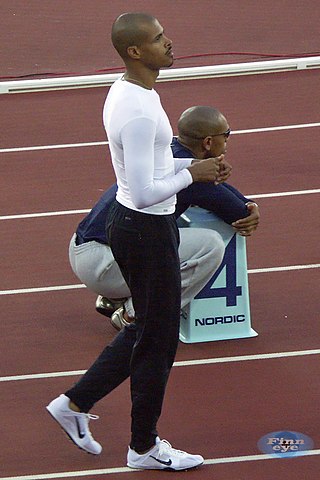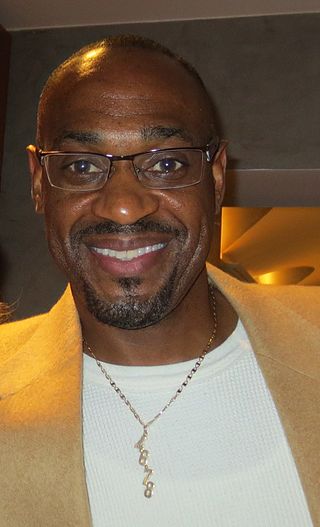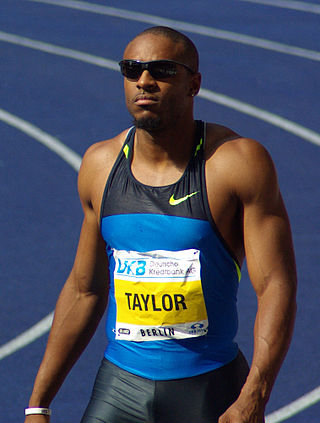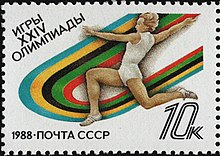
The 400 metres hurdles is a track and field hurdling event. The event has been on the Olympic athletics programme since 1900 for men and since 1984 for women.

The men's 400 metres hurdles at the 2004 Summer Olympics as part of the athletics program were held at the Athens Olympic Stadium from August 23 to 26. There were 35 competitors from 24 nations. The event was won by Félix Sánchez of the Dominican Republic, the nation's first medal in the men's 400 metres hurdles. Silver went to Danny McFarlane of Jamaica, returning to the podium in the event for the first time since 1992. Naman Keïta's bronze was France's first medal in the event in over 100 years; the last Frenchman to medal in the long hurdles was Henri Tauzin in 1900. The United States' five-Games gold medal streak ended; for only the second time in the history of the event, Americans competed but won no medals.

Senegal competed at the 2004 Summer Olympics in Athens, Greece, from 13 to 29 August 2004. This was the nation's eleventh appearance at the Olympics.
André Lamar Phillips is a retired American track and field athlete who is best known for winning the 400 metres hurdles gold medal at the 1988 Olympic Games.

The men's 400 metres hurdles was the longer of the men's hurdle races in the Athletics at the 1964 Summer Olympics program in Tokyo. It was held on 14 October, 15 October, and 16 October 1964. 39 athletes from 26 nations competed, with 1 more not starting in the first round. The maximum number of athletes per nation had been set at 3 since the 1930 Olympic Congress. The first round was held on 14 October, with the semifinals on 15 October and the final on 16 October. The event was won by Rex Cawley of the United States, the nation's sixth consecutive and 11th overall victory in the men's 400 metres hurdles. For the first time since 1952, the Americans did not sweep the event. John Cooper earned Great Britain's first medal in the event since 1928 with his silver; Salvatore Morale took Italy's first-ever medal in the 400 metres hurdles with his bronze.
The men's 400 metres at the 1988 Summer Olympics in Seoul, South Korea took place between 24 and 28 September 1988. Seventy-five athletes from 55 nations competed. The maximum number of athletes per nation had been set at 3 since the 1930 Olympic Congress. The event was won by 0.06 seconds by Steve Lewis of the United States, the second in what would ultimately be 7 consecutive American victories stretching from 1984 to 2008. As of May 2024, this remains the narrowest winning margin in the event since the introduction of fully automatic timing. The United States swept the podium in the event for the third time, having previously done so in 1904 and 1968.

The men's 200 metres at the 1988 Summer Olympics in Seoul, South Korea had an entry list of 72 competitors from 59 nations, with ten qualifying heats (72), five quarterfinal races (40) and two semifinals (16), before the final (8) took off on Wednesday September 28, 1988. The maximum number of athletes per nation had been set at 3 since the 1930 Olympic Congress. The event was won by Joe DeLoach of the United States, beating his teammate and defending champion Carl Lewis by 0.04 seconds in the final. The defeat ended Lewis's hopes of repeating his 1984 quadruple, despite running the final under his own Olympic record time. It was the United States' 14th victory in the men's 200 metres. Lewis was the seventh man to win multiple medals in the event, matching Andy Stanfield for the best result to that point. Robson da Silva earned Brazil's first medal in the event with his bronze.

Senegal has sent athletes to all Summer Olympic Games held since 1964. Unlike most surrounding nations, Senegal has never missed any Summer Olympics since its independence. Only once has the country won an Olympic medal: Amadou Dia Ba, who won a silver medal in the men's 400 metre hurdles in 1988. However, Abdoulaye Seye, representing France, won a bronze medal in the 200 metres in 1960, just two months after the short lived Mali Federation gained independence and a few days after Senegal seceded from the federation.
The men's 110 metres hurdles at the 1988 Summer Olympics in Seoul, South Korea had an entry list of 43 competitors from 31 nations, with six qualifying heats, four second-round races (32) and two semifinals (16) before the final (8) took place on Monday September 26, 1988. The maximum number of athletes per nation had been set at 3 since the 1930 Olympic Congress. The event was won by Roger Kingdom of the United States, the second man to successfully defend Olympic gold in the event. It was the nation's 17th title in the event. Colin Jackson's silver was Great Britain's first medal in the event since 1936.

The men's 400 metres hurdles was an event at the 1996 Summer Olympics in Atlanta, Georgia. There were 55 competitors from 35 nations. The maximum number of athletes per nation had been set at 3 since the 1930 Olympic Congress. The event was won by Derrick Adkins of the United States, the nation's fourth consecutive and 16th overall victory in the event. Samuel Matete of Zambia earned that nation's first medal in the event with his silver. American Calvin Davis took bronze.

The men's 400 metres hurdles was an event at the 1992 Summer Olympics in Barcelona, Spain. It was held from 3 to 6 August at the Estadi Olímpic Lluís Companys. There were 47 competitors from 35 nations. The maximum number of athletes per nation had been set at 3 since the 1930 Olympic Congress. The event was won by Kevin Young of the United States, the nation's third consecutive and 15th overall victory in the event. Winthrop Graham earned Jamaica's first men's 400 metres hurdles medal with his silver. Kriss Akabusi earned bronze, putting Great Britain on the podium in the event for the first time since 1980. The three medalists had finished in the same order in 1988, just outside of the medals that year in fourth through sixth places.

The men's 400 metres hurdles at the 1980 Summer Olympics in Moscow, Soviet Union had a start list of 22 competitors from 19 nations, with three quarterfinals, two semifinals (16), and a final (8) that took place on Saturday July 26, 1980. The maximum number of athletes per nation had been set at 3 since the 1930 Olympic Congress. The event was won by Volker Beck of East Germany, the nation's first medal in the event. Vasyl Arkhypenko earned silver, the second consecutive Games that the Soviet Union reached the podium in the event. Gary Oakes put Great Britain back on the podium after a one-Games absence with his bronze.

The men's 400 metres hurdles at the 2000 Summer Olympics as part of the athletics programme were held at Stadium Australia on Sunday 24 September, Monday 25 September and Wednesday 27 September 2000. There were 62 competitors from 45 nations. The event was won by 0.03 seconds by Angelo Taylor of the United States, the nation's fifth consecutive and 17th overall victory in the event. Saudi Arabia and South Africa each earned their first medals in the men's 400 metres hurdles, as Hadi Souan Somayli took silver and Llewellyn Herbert received bronze.

The men's 400 metres hurdles competition at the 2012 Summer Olympics in London, United Kingdom took place on 3–6 August at the Olympic Stadium. There were 49 competitors from 33 nations. The event was won by Félix Sánchez of the Dominican Republic, the second victory in the men's long hurdles for both the man and the nation. Sánchez was the eighth man to win multiple medals in the event and fourth to win two golds. Michael Tinsley of the United States earned silver. Javier Culson's bronze was Puerto Rico's first medal in the event.

The men's 400 metres hurdles was an event at the 1976 Summer Olympics in Montreal. The competition was held from July 23, 1976, to July 25, 1976. There were 22 competitors from 16 nations. The maximum number of athletes per nation had been set at 3 since the 1930 Olympic Congress. American Edwin Moses won the final in a world record and Olympic record time of 47.64 seconds, winning by 1.05 seconds. His time was initially noted as one hundredth slower, but this was rounded up after an analysis of the photo finish. It was the United States' first victory in the event since 1964 and 12th overall. Fellow American Michael Shine took silver. Yevgeniy Gavrilenko earned the Soviet Union's first medal in the event since 1952 with his bronze. Great Britain's three-Games podium streak in the event ended.

Senegal competed at the 2012 Summer Olympics in London, from 27 July to 12 August 2012. This was the nation's thirteenth appearance at the Olympics.

The men's 400 metres hurdles at the 1984 Summer Olympics in Los Angeles, California had an entry list of 45 competitors from 30 nations, with six qualifying heats and two semifinals (16) before the final (8) took place on Sunday August 5, 1984. The maximum number of athletes per nation had been set at 3 since the 1930 Olympic Congress. American Edwin Moses won his second Olympic gold medal after 1976, while his 18-year-old teammate Danny Harris took the silver medal. Moses' gold was the United States' 13th victory in the event. He became the sixth man to win multiple medals in the event, and the second to win multiple golds. Harald Schmid of West Germany took bronze, giving the nation its first medal in the 400 metres hurdles since 1968.
The men's 400 metres was an event at the 1972 Summer Olympics in Munich. The competition was held on 3, 4 and 7 September. Sixty-four athletes from 49 nations competed. The maximum number of athletes per nation had been set at 3 since the 1930 Olympic Congress. The event was won by 0.14 seconds by Vince Matthews of the United States, the nation's fifth consecutive and 12th overall victory in the event. The Americans' hopes to repeat their podium sweep of four years earlier were dashed by injury in the final. Bronze medalist Julius Sang became the first black African to win a sprint Olympic medal, earning Kenya's first medal in the event.

The men's 400 metres hurdles event at the 2016 Summer Olympics took place between 15–18 August at the Olympic Stadium. There were 47 competitors from 33 nations. The event was won by Kerron Clement of the United States, the nation's 19th victory in the men's long hurdles. Clement became the ninth man to win multiple medals in the event. Both Kenya and Turkey earned their first medals in the men's 400 metres hurdles, the former with Boniface Mucheru Tumuti's silver and the latter with Yasmani Copello's bronze.

Senegal competed at the 2016 Summer Olympics in Rio de Janeiro, from August 5 to 21, 2016. It was the nation's fourteenth consecutive appearance at the Summer Olympics since its debut in 1964.












